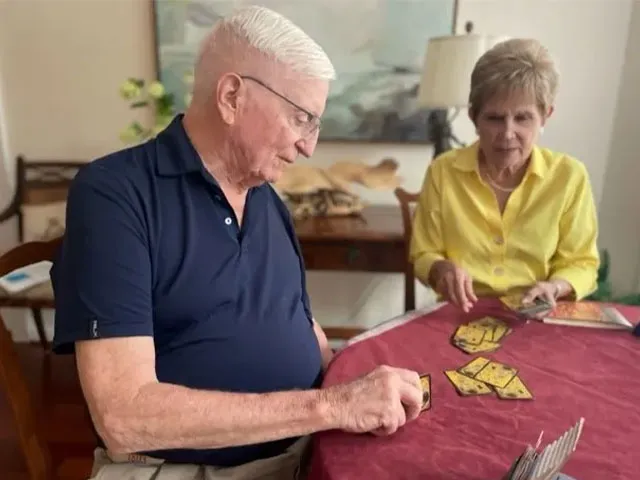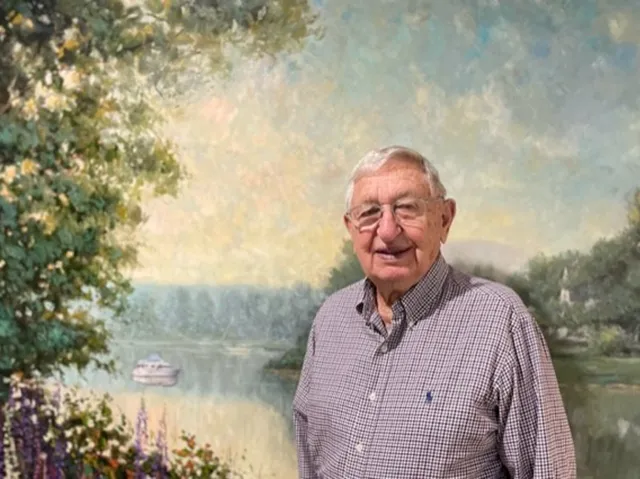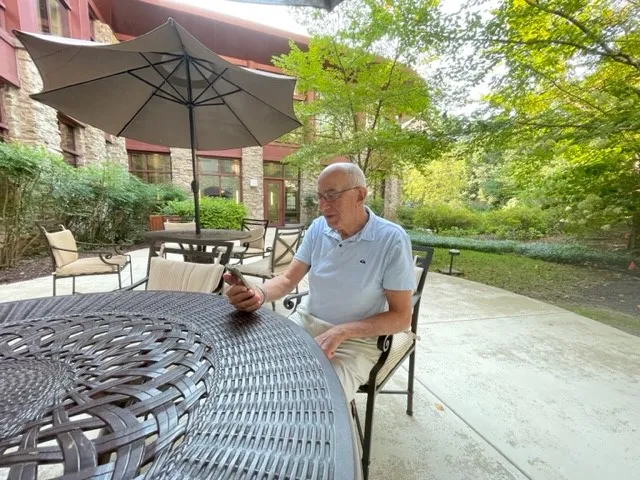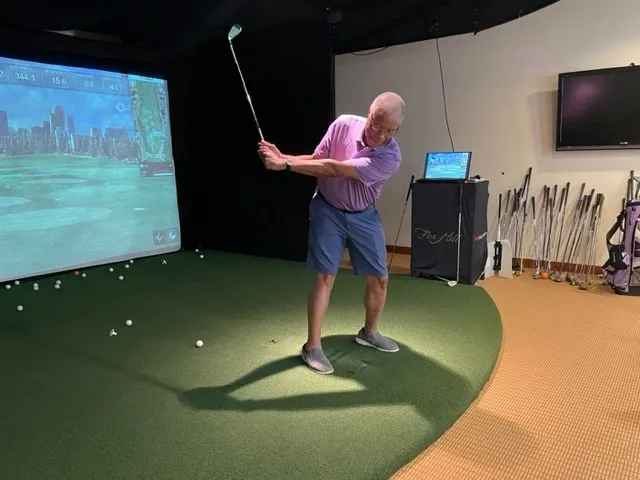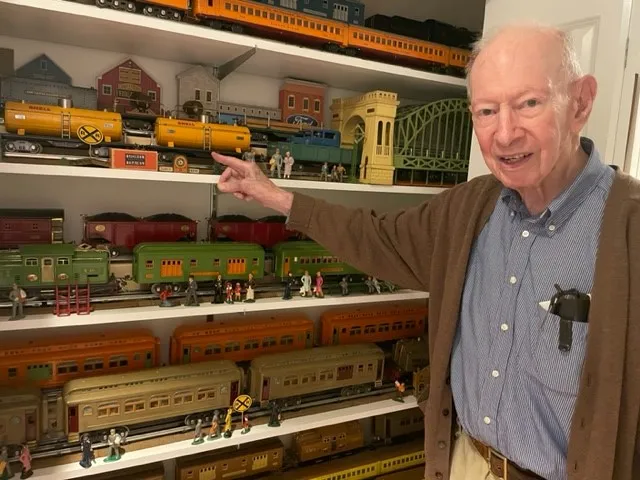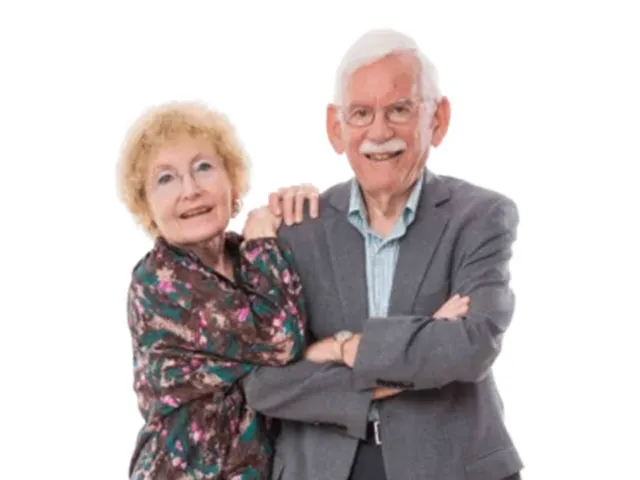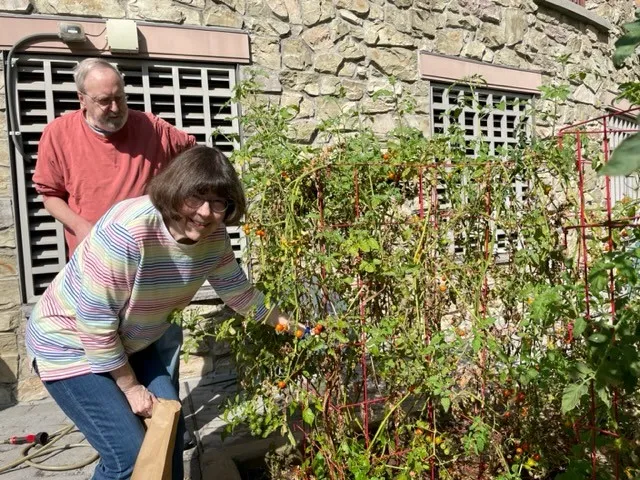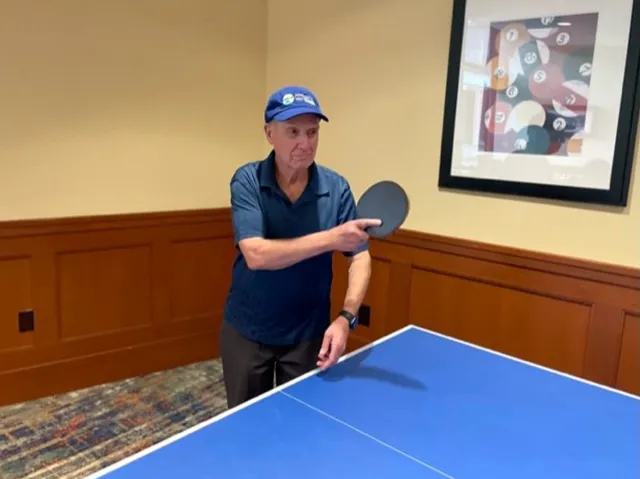Fellow condominium owners welcome you to learn more about Fox Hill.
Visit Fox Hill and you will likely see the leadership team chatting with senior living condominium owners. The staff loves making an exceptional community even better – and it shows.
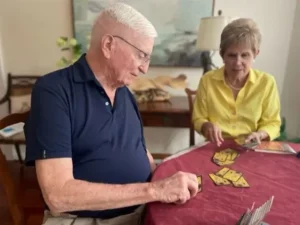 Parker and Adele moved to Fox Hill after a ten-year retirement in Ocean Ridge, Florida. It was a return to home. “Parker grew up in Washington, and we lived here as a couple for 45 years and now have one daughter and 3 grandchildren living nearby. It’s good to be back!”
Parker and Adele moved to Fox Hill after a ten-year retirement in Ocean Ridge, Florida. It was a return to home. “Parker grew up in Washington, and we lived here as a couple for 45 years and now have one daughter and 3 grandchildren living nearby. It’s good to be back!”
“We have found a great community at Fox Hill. We are now retired but eager to keep using our minds.” Parker was a Managing Director of Korn Ferry, an international executive search firm, where he headed the Global Financial practice and European operations. Adele was a Senior Fellow at the Urban Institute, a policy think tank in Washington, where she was Director of the Justice Policy Center. These careers produced continuing interests in business, social and economic policy, and labor market trends. “Our jobs entailed nearly constant travel, domestic and international. We lived in London several years. It was fabulous. We toured the houses and gardens, went to Wimbledon and Henley, and enjoyed the museums and music.”
“Fox Hill offers so many stimulating activities. Our favorites are the Current Affairs discussions, group tours of local museums, and wonderful chamber music concerts. It has been easy and interesting to meet new friends with a wide range of life stories to share. We meet at dinner to visit and join others for the tours.”
“Fox Hill’s convenience cannot be beat. We use the pool, gym, trainers, therapists, and exercise classes -- all first rate and right here. So many daily chores are made simple by the on-site services—car washing, salon, and ironing. The staff is so cheerful and helpful. Just ask and they try to get what you need.”
Fox Hill’s location has proved an unexpected bonus. “We have two daughters and 8 young adult grandchildren, all of whom seem to pass through Washington and stop for a visit, as do friends from the places we have lived and from where they have moved. We also venture out to performances at the Kennedy Center and Strathmore Hall.”
 Parker and Adele moved to Fox Hill after a ten-year retirement in Ocean Ridge, Florida. It was a return to home. “Parker grew up in Washington, and we lived here as a couple for 45 years and now have one daughter and 3 grandchildren living nearby. It’s good to be back!”
Parker and Adele moved to Fox Hill after a ten-year retirement in Ocean Ridge, Florida. It was a return to home. “Parker grew up in Washington, and we lived here as a couple for 45 years and now have one daughter and 3 grandchildren living nearby. It’s good to be back!”
“We have found a great community at Fox Hill. We are now retired but eager to keep using our minds.” Parker was a Managing Director of Korn Ferry, an international executive search firm, where he headed the Global Financial practice and European operations. Adele was a Senior Fellow at the Urban Institute, a policy think tank in Washington, where she was Director of the Justice Policy Center. These careers produced continuing interests in business, social and economic policy, and labor market trends. “Our jobs entailed nearly constant travel, domestic and international. We lived in London several years. It was fabulous. We toured the houses and gardens, went to Wimbledon and Henley, and enjoyed the museums and music.”
“Fox Hill offers so many stimulating activities. Our favorites are the Current Affairs discussions, group tours of local museums, and wonderful chamber music concerts. It has been easy and interesting to meet new friends with a wide range of life stories to share. We meet at dinner to visit and join others for the tours.”
“Fox Hill’s convenience cannot be beat. We use the pool, gym, trainers, therapists, and exercise classes -- all first rate and right here. So many daily chores are made simple by the on-site services—car washing, salon, and ironing. The staff is so cheerful and helpful. Just ask and they try to get what you need.”
Fox Hill’s location has proved an unexpected bonus. “We have two daughters and 8 young adult grandchildren, all of whom seem to pass through Washington and stop for a visit, as do friends from the places we have lived and from where they have moved. We also venture out to performances at the Kennedy Center and Strathmore Hall.”
 "Grammy Barbara", as she is affectionately known to her grandchildren and to everyone in the North Bethany Beach, DE community where she has vacationed for the last 54 years, is a five-year veteran of Fox Hill. She is an expatriate of Kalorama in DC, where she and her family lived in the same home for 49 years.
"Grammy Barbara", as she is affectionately known to her grandchildren and to everyone in the North Bethany Beach, DE community where she has vacationed for the last 54 years, is a five-year veteran of Fox Hill. She is an expatriate of Kalorama in DC, where she and her family lived in the same home for 49 years.
Her nickname masks the real Barbara Meyers. Raised in the northern reaches of New York State by the shores of Lake Ontario, Barbara graduated from Bryn Mawr. She was one of only five women in her class at the George Washington University School of Medicine and the George Washington University Internal Medicine Residency Program.
For 25 years she cared for patients at the Group Health Association's medical facility in downtown DC. She was a pioneer in delivering quality managed care to inner city residents. Barbara left clinical practice to become a DC area medical director for Aetna. After Aetna she became Clinical Director of Clinical Resource Management at the Washington Hospital Center.
Following retirement, Barbara continued to consult on claims for the Hospital Center. She also volunteered to help veterans and their families at Fisher House in Washington, DC.
Barbara will tell you that Fox Hill is "amazing" and that her time here has been and is an "adventure." She would also say that Fox Hill has enabled her to express her artistic side in a way that would have been more difficult in another environment. At Fox Hill Barbara has become a devoted quilter and knitter extraordinaire. Her "Fox Hill Foxes" quilt hangs outside the Performing Arts Center. For the holidays, Barbara and others in the Needlework group decorate the windows outside the art room with quilts, knitted items and other handmade holiday decor. They also make and donate quilts, baby blankets and other items for children to local charities.
Barbara chairs the owners' Sales Committee at Fox Hill. She delights in hosting small cocktail parties and dinners for her friends at Fox Hill and to welcome new members of the Fox Hill community.
 "Grammy Barbara", as she is affectionately known to her grandchildren and to everyone in the North Bethany Beach, DE community where she has vacationed for the last 54 years, is a five-year veteran of Fox Hill. She is an expatriate of Kalorama in DC, where she and her family lived in the same home for 49 years.
"Grammy Barbara", as she is affectionately known to her grandchildren and to everyone in the North Bethany Beach, DE community where she has vacationed for the last 54 years, is a five-year veteran of Fox Hill. She is an expatriate of Kalorama in DC, where she and her family lived in the same home for 49 years.
Her nickname masks the real Barbara Meyers. Raised in the northern reaches of New York State by the shores of Lake Ontario, Barbara graduated from Bryn Mawr. She was one of only five women in her class at the George Washington University School of Medicine and the George Washington University Internal Medicine Residency Program.
For 25 years she cared for patients at the Group Health Association's medical facility in downtown DC. She was a pioneer in delivering quality managed care to inner city residents. Barbara left clinical practice to become a DC area medical director for Aetna. After Aetna she became Clinical Director of Clinical Resource Management at the Washington Hospital Center.
Following retirement, Barbara continued to consult on claims for the Hospital Center. She also volunteered to help veterans and their families at Fisher House in Washington, DC.
Barbara will tell you that Fox Hill is "amazing" and that her time here has been and is an "adventure." She would also say that Fox Hill has enabled her to express her artistic side in a way that would have been more difficult in another environment. At Fox Hill Barbara has become a devoted quilter and knitter extraordinaire. Her "Fox Hill Foxes" quilt hangs outside the Performing Arts Center. For the holidays, Barbara and others in the Needlework group decorate the windows outside the art room with quilts, knitted items and other handmade holiday decor. They also make and donate quilts, baby blankets and other items for children to local charities.
Barbara chairs the owners' Sales Committee at Fox Hill. She delights in hosting small cocktail parties and dinners for her friends at Fox Hill and to welcome new members of the Fox Hill community.
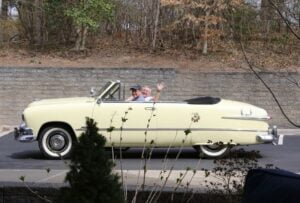
After completing the three-year requisite CPA apprenticeship in New York State, Bill decided he really didn’t want a career in public accounting and accepted a job with a small avionics company where he quickly rose through the ranks to become controller. In 1963 a recruiting firm matched Bill with the aircraft manufacturer Fairchild, then headquartered in Hagerstown Maryland. Bill was offered a job as Director of Finance for Fairchild’s space and electronics divisions.
In 1970 Bill left Fairchild with a colleague to join Atlantic Research Corporation (ARC) a small high-tech company in Alexandria, Virginia engaged in the manufacture of solid propellant rocket motors. In 1976 Bill and his partner negotiated a leveraged buyout of Atlantic Research. Three years later in 1979 Atlantic Research went public and in 1985, when Bill‘s partner retired, Bill became CEO. At the same time he was appointed to the Board of Trustees at Adelphi University, where he served for ten years.
ARC was growing rapidly and was then designing and manufacturing the Stinger anti-aircraft rocket motors, as well as the boosters for the Tomahawk cruise missile. The company had grown from 200 to over 5000 employees over the years. In 1989 Atlantic Research was the target of a hostile takeover, and Bill left the company to join the career of his wife, Judy, to whom he was married for 62 years.
Judy was running a nonprofit organization called TransCen which she had founded. Its mission was to find meaningful employment paths for individuals with special needs. The organization continues today. During those years, Judy and Bill, who were lifelong boaters, built an 84 foot cruising yacht and lived aboard her for 15 years. They cruised up and down the East Coast from Nova Scotia to Florida and the Bahamas, joined by family and friends.
In 2016, when Judy‘s health began to fail, Bill and Judy got out of boating and bought a two bedroom condo with den at Fox Hill. They found the transition from their active boating life to the welcoming lifestyle at Fox Hill a perfect segway. The friendly residents, access to excellent fitness facilities and amazing food choices make living at Fox Hill easy and pleasant. Bill particularly enjoys the Friday morning men's breakfast where the dining room hosts several tables of guys discussing a wide range of subjects, with good cheer abounding.
When Brooklyn-born Bill Borten graduated from Hempstead High School on Long Island in 1953, he had no idea what to select as his major in nearby Adelphi University where he was enrolling. Bill‘s dad, an attorney, strongly recommended that Bill study accounting saying that there would always be a job for him in that field. Bill took his dad’s advice and upon graduation took a job with Touche Niven, then one of America’s largest accounting firms.
After completing the three-year requisite CPA apprenticeship in New York State, Bill decided he really didn’t want a career in public accounting and accepted a job with a small avionics company where he quickly rose through the ranks to become controller. In 1963 a recruiting firm matched Bill with the aircraft manufacturer Fairchild, then headquartered in Hagerstown Maryland. Bill was offered a job as Director of Finance for Fairchild’s space and electronics divisions.
In 1970 Bill left Fairchild with a colleague to join Atlantic Research Corporation (ARC) a small high-tech company in Alexandria, Virginia engaged in the manufacture of solid propellant rocket motors. In 1976 Bill and his partner negotiated a leveraged buyout of Atlantic Research. Three years later in 1979 Atlantic Research went public and in 1985, when Bill‘s partner retired, Bill became CEO. At the same time he was appointed to the Board of Trustees at Adelphi University, where he served for ten years.
ARC was growing rapidly and was then designing and manufacturing the Stinger anti-aircraft rocket motors, as well as the boosters for the Tomahawk cruise missile. The company had grown from 200 to over 5000 employees over the years. In 1989 Atlantic Research was the target of a hostile takeover, and Bill left the company to join the career of his wife, Judy, to whom he was married for 62 years.
Judy was running a nonprofit organization called TransCen which she had founded. Its mission was to find meaningful employment paths for individuals with special needs. The organization continues today. During those years, Judy and Bill, who were lifelong boaters, built an 84 foot cruising yacht and lived aboard her for 15 years. They cruised up and down the East Coast from Nova Scotia to Florida and the Bahamas, joined by family and friends.
In 2016, when Judy‘s health began to fail, Bill and Judy got out of boating and bought a two bedroom condo with den at Fox Hill. They found the transition from their active boating life to the welcoming lifestyle at Fox Hill a perfect segway. The friendly residents, access to excellent fitness facilities and amazing food choices make living at Fox Hill easy and pleasant. Bill particularly enjoys the Friday morning men's breakfast where the dining room hosts several tables of guys discussing a wide range of subjects, with good cheer abounding.
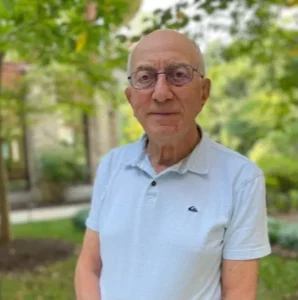 Born and raised in the Boston, MA area, Charlie is a tried-and-true fan of the Red Sox and Patriots — though the Washington teams are making headway. After graduating from Northeastern University with BSEE and MSEE degrees, he served 2 years as an officer in the US Army in Vietnam and the Electronic Warfare Lab at Ft. Monmouth NJ. Later in his career, he graduated from Seton Hall University with an MBA in finance.
Born and raised in the Boston, MA area, Charlie is a tried-and-true fan of the Red Sox and Patriots — though the Washington teams are making headway. After graduating from Northeastern University with BSEE and MSEE degrees, he served 2 years as an officer in the US Army in Vietnam and the Electronic Warfare Lab at Ft. Monmouth NJ. Later in his career, he graduated from Seton Hall University with an MBA in finance.
For over 50 years, Charlie has managed the realization of innovative systems and services. He started his career at Bell Labs, where his teams developed the first cordless telephone, first coin telephone on a high-speed train, and the first small electronic business system. As an executive in AT&T, he headed a special project --- the interactive kiosks for Disney World’s EPCOT for opening day. He then started a new company to develop a portable cellular telephone. He sold the company to LG of Korea, initiating their entry into the cellular market. “This was the most exciting, scary and satisfying three years of my professional life”, says Charlie.
Charlie continued his entrepreneurial journey not only in young companies, but also as a consultant and through teaching at Fairleigh Dickinson University. Before moving from New Jersey to Maryland, Charlie even managed a small senior living facility.
Since 2010, he has led a new team in designing the first guided self-service, medical micro-clinic providing remote physical examinations for triage and treatment. They are tackling the high costs of outpatient services by facilitating improved access to primary healthcare at points-of-convenience. They expect to deploy units, wherever patients live, work, travel and shop. Even today Charlie says, “the thrill of it all, and the opportunity to significantly contribute to better healthcare, drives me to solve the challenges with the right blend of old and new technologies.”
Charlie moved to Fox Hill in 2016, two years after his wife of 46 years passed away. Shortly after moving, he led an owner’s committee to review and guide improvements to the Wi-Fi system at Fox Hill; this led to better coverage throughout the complex, plus fiber to every condo providing improved Internet and TV, and private Wi-Fi access in each condo. Several years later, he was elected President of the condo association.
What he most enjoys are his friends in Fox Hill and his church in Potomac, not to mention his daughters’ families in Potomac and Annapolis. His six grandchildren, ages 10 to 22, are a delight for him in all their endeavors.
Charlie is a fun-loving and easy-going person who enjoys singing and dancing --- and dressing for the annual Halloween costume party. He says, “Fox Hill is an ideal location for people who are active and want to enjoy this next phase of their lives”.
 Born and raised in the Boston, MA area, Charlie is a tried-and-true fan of the Red Sox and Patriots — though the Washington teams are making headway. After graduating from Northeastern University with BSEE and MSEE degrees, he served 2 years as an officer in the US Army in Vietnam and the Electronic Warfare Lab at Ft. Monmouth NJ. Later in his career, he graduated from Seton Hall University with an MBA in finance.
Born and raised in the Boston, MA area, Charlie is a tried-and-true fan of the Red Sox and Patriots — though the Washington teams are making headway. After graduating from Northeastern University with BSEE and MSEE degrees, he served 2 years as an officer in the US Army in Vietnam and the Electronic Warfare Lab at Ft. Monmouth NJ. Later in his career, he graduated from Seton Hall University with an MBA in finance.
For over 50 years, Charlie has managed the realization of innovative systems and services. He started his career at Bell Labs, where his teams developed the first cordless telephone, first coin telephone on a high-speed train, and the first small electronic business system. As an executive in AT&T, he headed a special project --- the interactive kiosks for Disney World’s EPCOT for opening day. He then started a new company to develop a portable cellular telephone. He sold the company to LG of Korea, initiating their entry into the cellular market. “This was the most exciting, scary and satisfying three years of my professional life”, says Charlie.
Charlie continued his entrepreneurial journey not only in young companies, but also as a consultant and through teaching at Fairleigh Dickinson University. Before moving from New Jersey to Maryland, Charlie even managed a small senior living facility.
Since 2010, he has led a new team in designing the first guided self-service, medical micro-clinic providing remote physical examinations for triage and treatment. They are tackling the high costs of outpatient services by facilitating improved access to primary healthcare at points-of-convenience. They expect to deploy units, wherever patients live, work, travel and shop. Even today Charlie says, “the thrill of it all, and the opportunity to significantly contribute to better healthcare, drives me to solve the challenges with the right blend of old and new technologies.”
Charlie moved to Fox Hill in 2016, two years after his wife of 46 years passed away. Shortly after moving, he led an owner’s committee to review and guide improvements to the Wi-Fi system at Fox Hill; this led to better coverage throughout the complex, plus fiber to every condo providing improved Internet and TV, and private Wi-Fi access in each condo. Several years later, he was elected President of the condo association.
What he most enjoys are his friends in Fox Hill and his church in Potomac, not to mention his daughters’ families in Potomac and Annapolis. His six grandchildren, ages 10 to 22, are a delight for him in all their endeavors.
Charlie is a fun-loving and easy-going person who enjoys singing and dancing --- and dressing for the annual Halloween costume party. He says, “Fox Hill is an ideal location for people who are active and want to enjoy this next phase of their lives”.
 After almost 50 years living in northwest Washington, Don Coleman and his wife Madeleine moved to Fox Hill in 2018. Since arriving, both have been involved in the life of the community. Don, is currently Co-Chair of the IT Committee and has served on many Fox Hill committees including two years on the Condo Board. Despite the rich and varied cultural, health, educational, and other opportunities at Fox Hill, the Colemans find that the most satisfying aspect of the Fox Hill living experience is its friendly, interesting, and diverse residents.
After almost 50 years living in northwest Washington, Don Coleman and his wife Madeleine moved to Fox Hill in 2018. Since arriving, both have been involved in the life of the community. Don, is currently Co-Chair of the IT Committee and has served on many Fox Hill committees including two years on the Condo Board. Despite the rich and varied cultural, health, educational, and other opportunities at Fox Hill, the Colemans find that the most satisfying aspect of the Fox Hill living experience is its friendly, interesting, and diverse residents.
Don and Madeleine, both from Detroit, attended college in Michigan and with Don’s Ph.D. in electrical engineering in hand, they moved to Washington in 1971 where Don became an assistant professor in the electrical engineering department at Howard University. Don spent 40 years at Howard, as professor and chair of the Systems and Computer Science department, as Vice-President for Research, as Provost and Chief Academic Officer, and as a principal investigator on more than 45 R&D projects in the areas of computers, software, systems engineering, and education.
In the early 1980s, Don led the project to establish the first accredited department in computer science at an historical black college or university (HBCU). Don also spent several years working as a consultant and technology trainer throughout the developing world. In 1974, Don was an organizer of the first Pan African Conference to focus on technology in Africa.
Madeleine spent her entire career as an educator working for over 30 years on various levels of instructional, supervisory, professional, and research mediums at both public and private institutions. After graduation she taught in Milwaukee and Ann Arbor, where she also affiliated with the University of Michigan as a Practicum Supervisor in the early childhood Department, working on the development and implementation of a language-based curriculum model which incorporated theories of Piaget, Montessori, and others. Her work established the curriculum for Head Start Michigan. When in Washington, as Research Project Director of the National Black Child Development Institute she continued the Head Start project as a national training model and also managed an OCD grant which expanded the curriculum's focus to include the development of a positive self-concept in Black children and funded the national research on viable curriculum models. She then edited this work in "Black children Just Keep on Growing: Alternative Curriculum Models for Young Black Children".
In Washington, Madeleine also worked as a Lecturer, Department of Pediatrics, Georgetown Univ., Instructor, School of Social Work, Howard Univ., and Adjunct Professor, George Washington Univ.. Eventually, she moved to the Montgomery County Public System (MCPS) where she worked for more than 20 years as ow she a special education teacher, assistant principal, and principal., and was active in the area of special education to assist students with multiple disabilities and serious emotional disabilities.
Madeleine retired in 2002. If you ask her how she remembers her career, she will tell you, “I enjoyed every minute if it!”
Don and Madeleine have four children and seven beautiful grandchildren, some of whom live in the area and who visit Fox Hill and enjoy sharing Sunday brunch and other events with them. Don’s current activities and hobbies include golf, reading, and music. During bad weather days, Don can be found using the indoor gulf simulator at Fox Hill and swinging with gusto. Madeline can be found at the Book Club, Needle Work Group, Current Affairs and Women’s Breakfast. The Colemans are regulars at the weekly wine and cheese receptions where they enjoy meeting with other residents and talking with them.
 After almost 50 years living in northwest Washington, Don Coleman and his wife Madeleine moved to Fox Hill in 2018. Since arriving, both have been involved in the life of the community. Don, is currently Co-Chair of the IT Committee and has served on many Fox Hill committees including two years on the Condo Board. Despite the rich and varied cultural, health, educational, and other opportunities at Fox Hill, the Colemans find that the most satisfying aspect of the Fox Hill living experience is its friendly, interesting, and diverse residents.
After almost 50 years living in northwest Washington, Don Coleman and his wife Madeleine moved to Fox Hill in 2018. Since arriving, both have been involved in the life of the community. Don, is currently Co-Chair of the IT Committee and has served on many Fox Hill committees including two years on the Condo Board. Despite the rich and varied cultural, health, educational, and other opportunities at Fox Hill, the Colemans find that the most satisfying aspect of the Fox Hill living experience is its friendly, interesting, and diverse residents.
Don and Madeleine, both from Detroit, attended college in Michigan and with Don’s Ph.D. in electrical engineering in hand, they moved to Washington in 1971 where Don became an assistant professor in the electrical engineering department at Howard University. Don spent 40 years at Howard, as professor and chair of the Systems and Computer Science department, as Vice-President for Research, as Provost and Chief Academic Officer, and as a principal investigator on more than 45 R&D projects in the areas of computers, software, systems engineering, and education.
In the early 1980s, Don led the project to establish the first accredited department in computer science at an historical black college or university (HBCU). Don also spent several years working as a consultant and technology trainer throughout the developing world. In 1974, Don was an organizer of the first Pan African Conference to focus on technology in Africa.
Madeleine spent her entire career as an educator working for over 30 years on various levels of instructional, supervisory, professional, and research mediums at both public and private institutions. After graduation she taught in Milwaukee and Ann Arbor, where she also affiliated with the University of Michigan as a Practicum Supervisor in the early childhood Department, working on the development and implementation of a language-based curriculum model which incorporated theories of Piaget, Montessori, and others. Her work established the curriculum for Head Start Michigan. When in Washington, as Research Project Director of the National Black Child Development Institute she continued the Head Start project as a national training model and also managed an OCD grant which expanded the curriculum's focus to include the development of a positive self-concept in Black children and funded the national research on viable curriculum models. She then edited this work in "Black children Just Keep on Growing: Alternative Curriculum Models for Young Black Children".
In Washington, Madeleine also worked as a Lecturer, Department of Pediatrics, Georgetown Univ., Instructor, School of Social Work, Howard Univ., and Adjunct Professor, George Washington Univ.. Eventually, she moved to the Montgomery County Public System (MCPS) where she worked for more than 20 years as ow she a special education teacher, assistant principal, and principal., and was active in the area of special education to assist students with multiple disabilities and serious emotional disabilities.
Madeleine retired in 2002. If you ask her how she remembers her career, she will tell you, “I enjoyed every minute if it!”
Don and Madeleine have four children and seven beautiful grandchildren, some of whom live in the area and who visit Fox Hill and enjoy sharing Sunday brunch and other events with them. Don’s current activities and hobbies include golf, reading, and music. During bad weather days, Don can be found using the indoor gulf simulator at Fox Hill and swinging with gusto. Madeline can be found at the Book Club, Needle Work Group, Current Affairs and Women’s Breakfast. The Colemans are regulars at the weekly wine and cheese receptions where they enjoy meeting with other residents and talking with them.
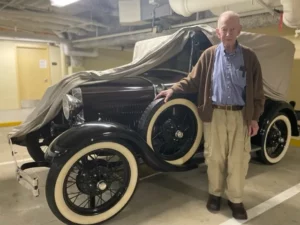 When Project Mercury astronauts Gordon Cooper and Pete Conrad splashed down in the Pacific Ocean on August, 21st, 1965, Dr. Howard Minners was among the first people to greet them. In his role as flight surgeon and chief of flight medicine at NASA-Houston from 1962 to 1966, it was Minners’ job to lead day-to-day tests, examinations, monitoring and overall health analysis of the astronauts from pre-launch to post-splashdown. He worked with most of the original Mercury Seven astronauts as well as new astronauts as they came on board.
When Project Mercury astronauts Gordon Cooper and Pete Conrad splashed down in the Pacific Ocean on August, 21st, 1965, Dr. Howard Minners was among the first people to greet them. In his role as flight surgeon and chief of flight medicine at NASA-Houston from 1962 to 1966, it was Minners’ job to lead day-to-day tests, examinations, monitoring and overall health analysis of the astronauts from pre-launch to post-splashdown. He worked with most of the original Mercury Seven astronauts as well as new astronauts as they came on board.
“It was an amazing and very important time for our country as we were full throttle into the Cold War and the Space Race,” says Minners, 91, who resides at Fox Hill with wife Eleanor. “I’m proud to have been a part of such an historic period. An Air Force major and flight surgeon, Minners was “on loan” to NASA.
“How well humans would tolerate zero-gravity, weightlessness and for how long was a big question,” Minners says. “You might have even needed gravity to help digest food and sustain proper blood pressure levels.
Minners moved with Eleanor to Fox Hill in 2015 and not long after unpacking rediscovered his “space box,” a crate packed with newspaper clippings, photos, and other memorabilia. He uses the materials in Mercury Project presentations he has made at Fox Hill and in local schools.
Minners holds an A.B. from Princeton University, an M.D. from Yale an M.A. in Public Health from Harvard. Among the highlights of his career are: Chief Geographic Medicine Branch and subsequently Associate Director for Collaborative Research with the National Institute of Allergy & Infectious Diseases at NIH; Chief of the WHO Office of Research Promotion and Development research office in Geneva; Assistant Surgeon General/Rear Admiral and Deputy Director of the U.S. Public Health Service Office of International Health, and Science Advisor to USAID.
Minners’ three years with WHO in Switzerland provided a special platform for him to help formulate health research objectives from a truly global perspective, which eventually led to another key post. “For 10 years at USAID I was given the opportunity to establish new research initiatives in biotechnology, agriculture, environment and natural resources,” Minners said. “We focused on developing countries, which was very rewarding.”
Minners today remains well informed on the ongoing evolution of space flight, and said that increasingly prolonged travel presents both challenges and opportunities. “Astronauts in the Mercury program were up for a week or so, now it’s months or even a year,” he explained. “Extended flight periods pose more health questions, again related to zero gravity, along with problems of isolation and adaption when returning to earth. But more is learned with every flight, and 60 years later we are still in the exploratory stages of what’s to come.”
 When Project Mercury astronauts Gordon Cooper and Pete Conrad splashed down in the Pacific Ocean on August, 21st, 1965, Dr. Howard Minners was among the first people to greet them. In his role as flight surgeon and chief of flight medicine at NASA-Houston from 1962 to 1966, it was Minners’ job to lead day-to-day tests, examinations, monitoring and overall health analysis of the astronauts from pre-launch to post-splashdown. He worked with most of the original Mercury Seven astronauts as well as new astronauts as they came on board.
When Project Mercury astronauts Gordon Cooper and Pete Conrad splashed down in the Pacific Ocean on August, 21st, 1965, Dr. Howard Minners was among the first people to greet them. In his role as flight surgeon and chief of flight medicine at NASA-Houston from 1962 to 1966, it was Minners’ job to lead day-to-day tests, examinations, monitoring and overall health analysis of the astronauts from pre-launch to post-splashdown. He worked with most of the original Mercury Seven astronauts as well as new astronauts as they came on board.
“It was an amazing and very important time for our country as we were full throttle into the Cold War and the Space Race,” says Minners, 91, who resides at Fox Hill with wife Eleanor. “I’m proud to have been a part of such an historic period. An Air Force major and flight surgeon, Minners was “on loan” to NASA.
“How well humans would tolerate zero-gravity, weightlessness and for how long was a big question,” Minners says. “You might have even needed gravity to help digest food and sustain proper blood pressure levels.
Minners moved with Eleanor to Fox Hill in 2015 and not long after unpacking rediscovered his “space box,” a crate packed with newspaper clippings, photos, and other memorabilia. He uses the materials in Mercury Project presentations he has made at Fox Hill and in local schools.
Minners holds an A.B. from Princeton University, an M.D. from Yale an M.A. in Public Health from Harvard. Among the highlights of his career are: Chief Geographic Medicine Branch and subsequently Associate Director for Collaborative Research with the National Institute of Allergy & Infectious Diseases at NIH; Chief of the WHO Office of Research Promotion and Development research office in Geneva; Assistant Surgeon General/Rear Admiral and Deputy Director of the U.S. Public Health Service Office of International Health, and Science Advisor to USAID.
Minners’ three years with WHO in Switzerland provided a special platform for him to help formulate health research objectives from a truly global perspective, which eventually led to another key post. “For 10 years at USAID I was given the opportunity to establish new research initiatives in biotechnology, agriculture, environment and natural resources,” Minners said. “We focused on developing countries, which was very rewarding.”
Minners today remains well informed on the ongoing evolution of space flight, and said that increasingly prolonged travel presents both challenges and opportunities. “Astronauts in the Mercury program were up for a week or so, now it’s months or even a year,” he explained. “Extended flight periods pose more health questions, again related to zero gravity, along with problems of isolation and adaption when returning to earth. But more is learned with every flight, and 60 years later we are still in the exploratory stages of what’s to come.”
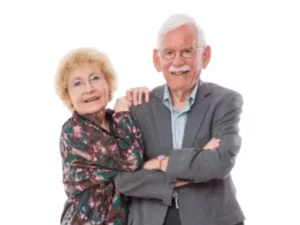 Ask Jack and Sydelle Sipress what brought them to Fox Hill after living in New Jersey for 50 years, and they’ll answer emphatically, “Our four-year-old granddaughter!” The Sipresses moved to Fox Hill’s senior condos in January 2009. They are still thrilled with their choice to live close to Natalie (who is now 19 years old) and her parents.
Ask Jack and Sydelle Sipress what brought them to Fox Hill after living in New Jersey for 50 years, and they’ll answer emphatically, “Our four-year-old granddaughter!” The Sipresses moved to Fox Hill’s senior condos in January 2009. They are still thrilled with their choice to live close to Natalie (who is now 19 years old) and her parents.
They are also glad they didn’t wait (as their own parents did) for decisions to be made for them. After extensive research, the Sipresses visited several retirement communities in the area. Nothing felt right – until they saw Fox Hill.
Although they downsized from a large house to a two-bedroom condominium, they feel they have upsized because there are so many amenities at Fox Hill, all under one roof. “This entire community is our house. We just happen to sleep in one part of it,” explains Sydelle. Natalie visits often and enjoys the amenities as much as her grandparents do.
“When I used to visit Grammy and Grampy, I really liked to go to the art studio to draw and paint with all of the supplies,” said Natalie. “I liked to take out a DVD from the library and watch movies at night. Also, it was fun to go to the game room with Grampy to play ping pong, pool and chess.” Natalie remembers fondly her birthday parties at the indoor swimming pool and a violin recital in the Performing Arts Center at Fox Hill.
When the Sipresses’ other son and his wife visit from Minnesota for Thanksgiving with their -year-old daughter, there’s room for the whole family of eight to gather around the table. Both granddaughters enjoyed spending the night in the Sipresses’ condominium.
According to Jack, “If grandparents are concerned whether there is enough room for the kids, that shouldn’t be a problem.” Sydelle adds, “Even if they all came at one time, there’s room for large families. If people think of all of Fox Hill as their residence rather than just the condominium, then it should be easy to have any number of grandchildren coming as frequently as they can handle them.”
 Ask Jack and Sydelle Sipress what brought them to Fox Hill after living in New Jersey for 50 years, and they’ll answer emphatically, “Our four-year-old granddaughter!” The Sipresses moved to Fox Hill’s senior condos in January 2009. They are still thrilled with their choice to live close to Natalie (who is now 19 years old) and her parents.
Ask Jack and Sydelle Sipress what brought them to Fox Hill after living in New Jersey for 50 years, and they’ll answer emphatically, “Our four-year-old granddaughter!” The Sipresses moved to Fox Hill’s senior condos in January 2009. They are still thrilled with their choice to live close to Natalie (who is now 19 years old) and her parents.
They are also glad they didn’t wait (as their own parents did) for decisions to be made for them. After extensive research, the Sipresses visited several retirement communities in the area. Nothing felt right – until they saw Fox Hill.
Although they downsized from a large house to a two-bedroom condominium, they feel they have upsized because there are so many amenities at Fox Hill, all under one roof. “This entire community is our house. We just happen to sleep in one part of it,” explains Sydelle. Natalie visits often and enjoys the amenities as much as her grandparents do.
“When I used to visit Grammy and Grampy, I really liked to go to the art studio to draw and paint with all of the supplies,” said Natalie. “I liked to take out a DVD from the library and watch movies at night. Also, it was fun to go to the game room with Grampy to play ping pong, pool and chess.” Natalie remembers fondly her birthday parties at the indoor swimming pool and a violin recital in the Performing Arts Center at Fox Hill.
When the Sipresses’ other son and his wife visit from Minnesota for Thanksgiving with their -year-old daughter, there’s room for the whole family of eight to gather around the table. Both granddaughters enjoyed spending the night in the Sipresses’ condominium.
According to Jack, “If grandparents are concerned whether there is enough room for the kids, that shouldn’t be a problem.” Sydelle adds, “Even if they all came at one time, there’s room for large families. If people think of all of Fox Hill as their residence rather than just the condominium, then it should be easy to have any number of grandchildren coming as frequently as they can handle them.”
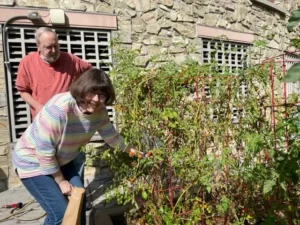 In 2017 after years of managing a large single family home, Marilyn Moon and Douglas Gomery realized that it was time to downsize. They took the time to decide which of their many books and accumulated treasures they wanted to keep, rather than having to act in a crisis with the pressure to make quick decisions. They enjoy the many ways in which life is easier now: a bus ride to the Kennedy Center that deposits you at the front door rather than hassling with parking, a short walk to the gym or pool to keep physically active, access to the restaurants and the bank inside in bad weather, and the ability to attend many on-site events. They also like the ability to be less social at times, a comfort to folks who are used to hours of quiet research and reading.
In 2017 after years of managing a large single family home, Marilyn Moon and Douglas Gomery realized that it was time to downsize. They took the time to decide which of their many books and accumulated treasures they wanted to keep, rather than having to act in a crisis with the pressure to make quick decisions. They enjoy the many ways in which life is easier now: a bus ride to the Kennedy Center that deposits you at the front door rather than hassling with parking, a short walk to the gym or pool to keep physically active, access to the restaurants and the bank inside in bad weather, and the ability to attend many on-site events. They also like the ability to be less social at times, a comfort to folks who are used to hours of quiet research and reading.
Marilyn was a health researcher, focusing mainly on Medicare. She advised Congress first at the Congressional Budget Office and then through years of testimony to bring to the policy debate relevant research on the impacts of policy changes on the Medicare population. She wrote multiple books and articles on aspects of health care and the economic status of older Americans, at the University of Wisconsin and at the Urban Institute. She was the first Director of Public Policy at AARP and a public trustee of Medicare and Social Security. At the American Institutes for Research, she analyzed health care financing and managed groups working on diverse issues, including measuring the quality of hospital health care and how to communicate with people in case of a pandemic (long before Covid). She serves on the Board of the Medicare Rights Center, and has served on the Boards of the Holy Cross Health Care system and the National Academy of Social Insurance. She is a member of the National Academy of Medicine.
Douglas was a prolific writer on a wide range of issues surrounding mass communications, particularly film. As a professor at the University of Maryland for over 25 years, he wrote over 25 books including a popular textbook on the history of film, and more than a thousand articles. He examined how the film industry adapted from a silent era to sound films, how people have watched movies over the years (“Shared Pleasures”), how the movie industry works in the U.S., and the history of public broadcasting across a range of media. After retiring, he continued to write including a labor of love on Patsy Cline—a fabulous singer who grew up in Northern Virginia and is renowned even today years after her tragic early death. He is currently finishing his “last project” on a history of the Paramount movie studio.
If you ask them, they will tell you that “Fox Hill is a lovely place to interact with others from a diverse range of experiences. It’s a chance to learn new things, explore different perspectives and be as active as you wish to be.”
 In 2017 after years of managing a large single family home, Marilyn Moon and Douglas Gomery realized that it was time to downsize. They took the time to decide which of their many books and accumulated treasures they wanted to keep, rather than having to act in a crisis with the pressure to make quick decisions. They enjoy the many ways in which life is easier now: a bus ride to the Kennedy Center that deposits you at the front door rather than hassling with parking, a short walk to the gym or pool to keep physically active, access to the restaurants and the bank inside in bad weather, and the ability to attend many on-site events. They also like the ability to be less social at times, a comfort to folks who are used to hours of quiet research and reading.
In 2017 after years of managing a large single family home, Marilyn Moon and Douglas Gomery realized that it was time to downsize. They took the time to decide which of their many books and accumulated treasures they wanted to keep, rather than having to act in a crisis with the pressure to make quick decisions. They enjoy the many ways in which life is easier now: a bus ride to the Kennedy Center that deposits you at the front door rather than hassling with parking, a short walk to the gym or pool to keep physically active, access to the restaurants and the bank inside in bad weather, and the ability to attend many on-site events. They also like the ability to be less social at times, a comfort to folks who are used to hours of quiet research and reading.
Marilyn was a health researcher, focusing mainly on Medicare. She advised Congress first at the Congressional Budget Office and then through years of testimony to bring to the policy debate relevant research on the impacts of policy changes on the Medicare population. She wrote multiple books and articles on aspects of health care and the economic status of older Americans, at the University of Wisconsin and at the Urban Institute. She was the first Director of Public Policy at AARP and a public trustee of Medicare and Social Security. At the American Institutes for Research, she analyzed health care financing and managed groups working on diverse issues, including measuring the quality of hospital health care and how to communicate with people in case of a pandemic (long before Covid). She serves on the Board of the Medicare Rights Center, and has served on the Boards of the Holy Cross Health Care system and the National Academy of Social Insurance. She is a member of the National Academy of Medicine.
Douglas was a prolific writer on a wide range of issues surrounding mass communications, particularly film. As a professor at the University of Maryland for over 25 years, he wrote over 25 books including a popular textbook on the history of film, and more than a thousand articles. He examined how the film industry adapted from a silent era to sound films, how people have watched movies over the years (“Shared Pleasures”), how the movie industry works in the U.S., and the history of public broadcasting across a range of media. After retiring, he continued to write including a labor of love on Patsy Cline—a fabulous singer who grew up in Northern Virginia and is renowned even today years after her tragic early death. He is currently finishing his “last project” on a history of the Paramount movie studio.
If you ask them, they will tell you that “Fox Hill is a lovely place to interact with others from a diverse range of experiences. It’s a chance to learn new things, explore different perspectives and be as active as you wish to be.”
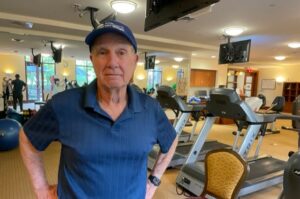
Neil was born and raised in a small New York City apartment, went to CCNY for his undergraduate degree and then to St. John’s Law School. After a stint in US Army as a JAG officer, he worked for the US Securities and Exchange Commission and became its Chief Trial Attorney. Later he became the executive vice president and general counsel of a publicly traded bank and then head of the securities enforcement and investigations practice at a major Washington law firm. He also taught securities law and professional responsibility at Georgetown and Albany law schools.
Neil spent much of his career chasing or defending financial fraud cases. From the fugitive financier Robert Vesco, Stratton Oakmont, Enron, and Stanford he was and still is fascinated by trying to figure out what motivates fraudsters and the people who lose their hard-earned savings in such schemes.
That analytical bent was central to the decision to move to Fox Hill. Neil would tell you that his biggest fears in moving to a senior community was losing his independence and being isolated from friends, family, and the world at large. Even after cutting down on his law practice, Neil remained vice chairman of the Board of the Anacostia Watershed Society and a board member of the Securities and Exchange Commission Historical Society. He’s devoted to his daughters and four grandchildren and an avid tennis player. His beach retreat on the Delaware shore, mentoring young lawyers, photography and a variety of other pursuits take him out of the Fox Hill environment and keep him connected to the world.
What Neil has learned about Fox Hill and himself is that it is possible to have one’s cake and eat it too. Here Neil enjoys spacious apartments, engaging common spaces, superior dining, and easy access to everything the Washington area has to offer, with the ready availability of healthcare and other services should the need arise.
And if you probe him further, Neil will also tell you that the people whom he has met who live at Fox Hill are among the friendliest and most engaging of anywhere he has lived.
Neil moved to Fox Hill in the fall of 2022 from downtown Bethesda. Having lived in a comfortable, convenient home in downtown Bethesda for many years, the decision to move was not easy. It was long in the making and not without much inner turmoil.
Neil was born and raised in a small New York City apartment, went to CCNY for his undergraduate degree and then to St. John’s Law School. After a stint in US Army as a JAG officer, he worked for the US Securities and Exchange Commission and became its Chief Trial Attorney. Later he became the executive vice president and general counsel of a publicly traded bank and then head of the securities enforcement and investigations practice at a major Washington law firm. He also taught securities law and professional responsibility at Georgetown and Albany law schools.
Neil spent much of his career chasing or defending financial fraud cases. From the fugitive financier Robert Vesco, Stratton Oakmont, Enron, and Stanford he was and still is fascinated by trying to figure out what motivates fraudsters and the people who lose their hard-earned savings in such schemes.
That analytical bent was central to the decision to move to Fox Hill. Neil would tell you that his biggest fears in moving to a senior community was losing his independence and being isolated from friends, family, and the world at large. Even after cutting down on his law practice, Neil remained vice chairman of the Board of the Anacostia Watershed Society and a board member of the Securities and Exchange Commission Historical Society. He’s devoted to his daughters and four grandchildren and an avid tennis player. His beach retreat on the Delaware shore, mentoring young lawyers, photography and a variety of other pursuits take him out of the Fox Hill environment and keep him connected to the world.
What Neil has learned about Fox Hill and himself is that it is possible to have one’s cake and eat it too. Here Neil enjoys spacious apartments, engaging common spaces, superior dining, and easy access to everything the Washington area has to offer, with the ready availability of healthcare and other services should the need arise.
And if you probe him further, Neil will also tell you that the people whom he has met who live at Fox Hill are among the friendliest and most engaging of anywhere he has lived.

